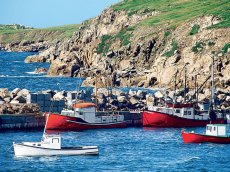Halifax is the capital of Nova Scotia and the largest urban area in Atlantic Canada. On 1 April 1996 Halifax was amalgamated with neighbouring communities to form the Halifax Regional Municipal Government. Halifax Regional Municipality occupies a strategic and central location on the province's east coast and is one of the world's largest harbours. Sometimes called "Warden of the North" for its historic military role, today it is a major regional centre for Atlantic Canada's economy.
Settlement
Human settlement of present day Nova Scotia dates back to the end of the last Ice Age, approximately 13, 000 years ago, when groups of hunter gatherers moved into the area to hunt caribou. Oral tradition identifies these early settlers as the forefathers of the Mi’kmaq people, who occupied a territory stretching from the Gaspé Peninsula to Cape Breton Island, called Mi’kma’ki. The Mi’kmaq did not establish permanent settlements, but moved in seasonal rounds from coastal regions in the summer where they fished and hunted, to inland areas in the winter where they hunted game such as moose, caribou, muskrat and bear. One coastal area used by the Mi’kmaq was Jipugtug, later Anglicised as Chebucto, which meant “the biggest harbour.” The Mi’kmaq were prosperous and greatly impressed early Europeans.
In 1746 the British government sponsored the first settlement plan in North America, focused on present-day Halifax. This settlement was undertaken for a number of reasons, including countering the Catholic presence throughout Acadia and the French military presence at Louisbourg, but more importantly exploiting the rich cod fishery. In 1749 some 2, 500 settlers, mostly poor and recruited mainly from England, arrived, led by Colonel Edward Cornwallis. Cornwallis selected Chebucto as the site of the new settlement because of its fine ice-free harbour, the second largest in the world. First named Chebucto, it was renamed Halifax shortly after in honour of George Dunk, Earl of Halifax and Chief Lord of Trade and Plantations, who masterminded its settlement. The first settlers had free building lots, but few houses were completed before winter. While some people stayed aboard ship and some others died, almost 1, 000 departed for Boston and other US destinations. However, merchants, many trying to escape debt, indenture or hoping to profit from the money being invested in the colony, soon arrived from New England. A governor's residence, an Anglican church, wharves, modest defence facilities and wooden houses were all built within a year. To bolster the settlement’s population, Germans, known as "Foreign Protestants, " were recruited and given land just north of the town.
Relations between the Mi’kmaq and English were strained. The Mi’kmaq felt that the English had settled on their lands without their permission, and English officials initially refused to adopt the custom of giving presents in exchange for use of the land. Cornwallis wanted to bring the Mi’kmaq under his authority, but they refused. In retaliation Cornwallis set a bounty on Mi’kmaq scalps. The Mi’kmaq in turn declared war on the British in 1749. The French at Louisbourg encouraged this antagonism, and provided weapons and money for the Mi’kmaq war on the English. The Mi’kmaq attacked British settlements, and conducted a successful raid on Dartmouth in 1751.
In August 1755 the British deported the Acadians, descendants of French settlers, who they saw as a potential threat. The deportation of the Acadian population and the British capture of Ile Royale and Ile Saint-Jean effectively ended French influence in the region. The Mi’kmaq were left to oppose the British on their own, and the chiefs signed a peace treaty with British officials in 1761. However, the American Revolution (1775-83) led the British to reinforce its military presence at Halifax and also brought an influx of Loyalist refugees. These factors tipped the balance of power against the Mi’kmaq in the region, who were quickly dispossessed of their remaining lands.
Development
Halifax is on the margin of the Canadian, North American and North Atlantic trading world. This location led to slower growth than most other large Canadian cities. Until the early 19th century exports of fish and forest staples were comparatively small and trade activity risky. During the Napoleonic Wars (1793-1815) wartime activity buoyed the local economy, as Britain and its Royal Navy needed a safe supply of timber. Thereafter, economic growth based on privateering, international shipping and trade, especially with the Caribbean region, expanded wealth and population, culminating in a "golden age" of prosperity in the mid-1800s. Enos Collins established the Halifax Banking Company, while Samuel Cunard earned his early fortune in the city.
passive communication affordable and stylish ian murray society of editors church society international fc happy international womens day quotes coworking spaces are betting stylish cute baby boy outfits nintendo switch 51 worldwide games international dialling codes how to start a private home care business google coworking space how to open a business account with barclays definition of verbal communication parking at belfast international airport stylish dining room what are core values of a business how do you make a business page on facebook student coworking space voxi international calls best coworking space london international house christmas tv guide when's international men's day happy international womens day what does the finance department do in a business how make a business stylish toaster outdoor furniture communication disability stylish homeware water management society how to change cover photo on facebook business page outdoor patio lights stylish baby girl clothes how to create a website for a business high iq society how to set up fb business page how many days to christmas how to get business registration number hotel coworking how to write a good business plan power line communication explore how innovation and enterprise contribute to the success of business stylish headphones







